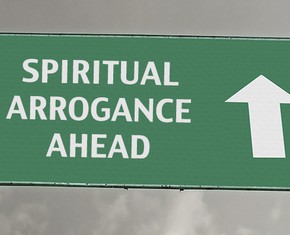The views expressed in our content reflect individual perspectives and do not represent the authoritative views of the Baha'i Faith.
Perhaps there is no greater huri or mystery for us than our own soul. The Baha’i teachings say that our souls, despite what many people think, never enter our bodies, as Abdu’l-Baha, the son of Baha’u’llah, the prophet and founder of the Baha’i Faith, explains in “Some Answered Questions”:
… the rational soul is the substance through which the body subsists. If the accident—the body—is destroyed, the substance—the spirit—remains.
… the rational soul, or the human spirit, does not subsist through this body by inherence—that is to say, it does not enter it; for inherence and entrance are characteristics of bodies, and the rational soul is sanctified above this. It never entered the body to begin with, that it should require, upon leaving it, some other abode. No, the connection of the spirit with the body is even as the connection of this lamp with a mirror.
Possibly the most intriguing aspect of this intermediary relationship between the soul and the body is that this distinction between the real you and the metaphorical expression of you is sometimes veiled even from your own sense of self.
RELATED: How I Fought My Ego to Find My Soul
For example, while a stroke or other physical disabilities may deprive us of the capacity to express to others what we are feeling, thinking, or becoming, brain injury or dysfunction can also cause us to lose our own sense of self. Amnesia is an obvious example of this, but so is Alzheimer’s disease and other sources of dementia .
Stated axiomatically, so long as our consciousness maintains its associative relationship with the body through the brain, our awareness of our own self is dependent on a healthy brain functioning in association with a healthy body.
Stated in a broader context, we receive information from two fundamental sources while we are in our second stage of existence — our associative relationship with physical reality. We derive or infer ideas indirectly through the information gathered by our senses, information that is then channeled through the brain to the mind, and thence to the repository of memory in the soul. This inferential process is one process employed in scientific methodology, the inductive method.
Additionally, we may receive information through intuition, inspiration, prayer, or reflection — that is, ideas and information which may come from the realm of the spirit.
The point is that while some may give more credence to one or the other of these two fundamental modalities, one source is not necessarily more valuable or more reliable than the other. Both processes are subject to misinformation, whether through faulty data or logic in the case of the indirect process, or through vain imaginations in the case of what we believe to be divine inspiration. In short, no matter what our source of information about reality may be while we are in the physical stage of our existence, we are challenged to evaluate the validity and usefulness of this information with the rational faculty of our conscious mind.
Because all information, from whatever source, ultimately ends up in the repository of our conscious mind, we can have only a relative degree of certitude in this life about our own powers to arrive at correct conclusions. For this reason, the holy texts function as our touchstone against which we can assess the conclusions we make.
These divine scriptures are, in this sense, the infallible “standard,” the “balance,” the “scales” by which all other verities are assayed. It is precisely for this reason that the Baha’i teachings ask us to review our progress and efforts on a daily basis. Only by such systematic weighing of our own perspectives against the standards set forth by an infallible and totally reliable resource can we have any degree of confidence or certitude that we are complying with reality in a way that is in our best interest.
RELATED: What Will We Carry Into the Afterlife?
In the third stage of our existence, that is, after death, when our conscious mind and other essential human powers are released from the constraints of having to work through the intermediary of an ever more dysfunctional brain and body, we will find ourselves capable of understanding and progressing more rapidly. However, we will always be exhorted to attain understanding through the exercise of our will, and to express that understanding in some form of action. Perhaps that action will be to assist those still in an associative relationship with physical reality, or to perform other tasks presently quite beyond our understanding.
As we consider this ingenious process by which we are led to know and understand our own nature— even as we simultaneously come to know and love the Creator in Whose image we have been created—it finally becomes clear that the veiling of spiritual reality from us is the only way that we could have become responsible for our own progress and enlightenment, as Baha’u’llah succinctly observes in an axiom from “The Hidden Words”:
O Son of My Handmaid! Didst thou behold immortal sovereignty, thou wouldst strive to pass from this fleeting world. But to conceal the one from thee and to reveal the other is a mystery which none but the pure in heart can comprehend.
















Comments
Sign in or create an account
Continue with Googleor